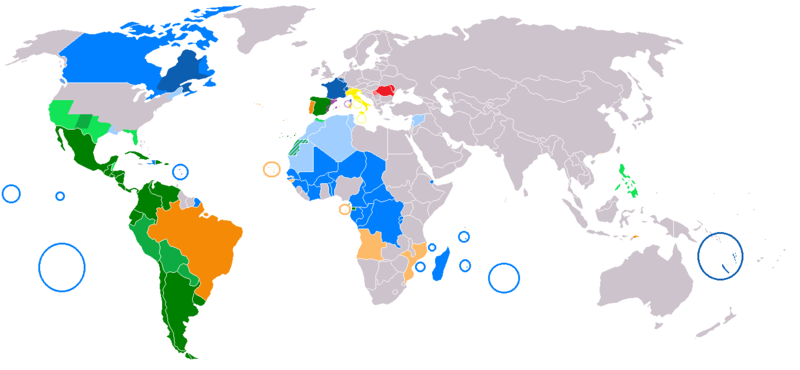
The story of Rome’s rapid conquer of Europe is known to anyone who knows basic 7th grade history, but the story of the conquest of the Latin language is vague in the minds of most of us. If we asked ourselves how it came about, we would probably think of the widespread supremacy of Latin as a result of the rapid conquering of Europe. Although the Latin language is dead, there are still many scholars and schools that are fluent in it and teach it, as well as the Catholic Church using it up until the 20th Century and it being the official language of the Vatican City. We still know so much about the language’s etymology although it is considered “dead”.
Latin has relations to Etruscan, ancient Greek and other Indo-European Languages (more about Indo-European Languages here). More on the letters and phonetics of those languages in relation to Latin can be seen here and here. One can see the similarities in the written letters and according to Florian Coulmas, author of The Blackwell Encyclopedia of Writing Systems, the most common language, being Latin, derived from the first true alphabet, Greek. We can see that on the pages with links above. The Greek and Latin letters are sometimes indistinguishable.

We see similar happenings in our society. As the Romans adopted words, letters, sounds etc. from the Indo-European languages, and especially Greek, we (English speakers) do the same. Perhaps even more intensely, we adopt words and pronunciations from other languages, even ones completely unrelated. This makes English one of the hardest languages to master; it is ever changing and one cannot always apply the same rules to all words. The pronunciation of the French word foyer, as in a lobby or reception area, is an example of this. This word is completely adopted from the French. If we were to pronounce it with an English accent it would be pronounced with a definite “r” sound at the end. If we were to pronounce it with the correct pronunciation, since it is a French word we are speaking, it would be pronounced “foi-yey”. This is, perhaps, a more intense and obvious way of manipulating the written language like the Romans did with the Indo-European Languages.
Works Cited
Coulmas, Florian. The Blackwell Encyclopedia of Writing Systems. Oxford, OX, UK: Blackwell, 1996. Print. The Blackwell Encyclopedia of Writing Systems.
English is a mix of many different languages, so it would make sense that other languages are also derived from languages that have come before. As people are conquered, they are expected to adopt the language of the nation that won the war. This can be how languages are wiped out or changed. This is how the Akkadian written language was formed. The Akkadians stole a writing system from the neighboring country Sumeria.
ReplyDeleteIt's interesting how languages are so fluid and connected with each other but still so separate. There is some similarities between languages with the same roots, but even then there are enough differences that it qualifies as a different language. Do you think that over hundreds or thousands of years, enough languages would meld together that there would only be one or two worldwide, or do you think that languages will always remain distinctly separate? (Until we all learn the Adamic language, anyway.)
ReplyDeleteThat's a really interesting question, Kimberly. I don't know about one or 2 but maybe one or two for every alphabet or phonetic system..
ReplyDeleteAnd Emily, that's really interesting about Akkadia. It's interesting finding the similarities like this one and the water/creation theme (found in many earlier posts).